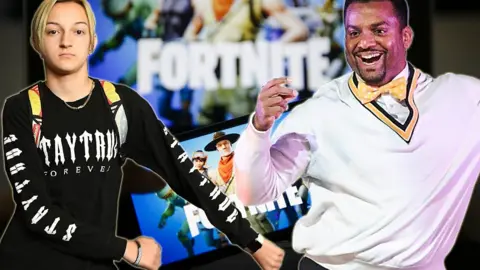Racing game Forza pulls dances amid Fortnite legal action
 Getty Images
Getty ImagesMicrosoft has removed two dance moves from its Forza series of racing games, following questions over the legality of such moves in video games.
It comes as Epic Games, the creators of Fortnite, faces further legal action, from a mother alleging it had copied her son's dance without permission.
The boy joins rapper 2 Millly, actor Alfonso Ribeiro and floss dancer Backpack Kid in suing the Epic Games.
Fortnite said it did not comment on ongoing litigation.
The Random
The Carlton and the Floss, both dances under dispute, have now been removed from Microsoft-owned game Forza Horizon 4.
Players could previously choose for driver avatars to perform these dances when they appeared on screen. Other dance moves remain.
Microsoft has not commented on the removal of the dances.
The latest legal action against Fortnite was filed in California on behalf of a YouTuber known as Orange Shirt Boy, over a dance move named the Random.
His mother complained Epic Games had not credited him or sought his consent to use, display or reproduce the dance.
The boy performed it as part of a competition organised by Epic Games, in which gamers were asked to submit videos, with the winning dance going on to feature in Fortnite.
Orange Shirt Boy did not win but players petitioned to have his dance included in the game, which Epic eventually did, although, unlike other dance moves for Fortnite avatars, it was never sold to players.
The legal action makes no mention of the competition and tweets discussing it have now been deleted, according to Variety magazine.
Originality test
The cases against Fortnite raise interesting questions about whether a dance can be copyrighted and will be carefully watched by other games-makers keen to avoid similar legal action.
Fortnite is free to download but makes money from selling add-ons such as cosmetic elements, known as skins, and dance moves, known as emotes.
Courts deciding whether such moves are subject to copyright will look at a range of factors, including the level of creativity, the complexity or length of the dance and how it was created.
Most of the dance moves in video games are short, leading some lawyers to question whether they are too basic to be copyrighted.
"It becomes very difficult when every building block of culture becomes somebody's property in a way that can exclude people from using it," Thomas Kadri, a fellow at Yale Law School told the New York Times.
But Carl Steele, a partner at law firm Ashfords, told the BBC: "It is possible for a dance to be protected by copyright in the UK but in order to do so it must be fixed - videoed or photographed - and it must show it is original, which can be difficult to prove."
Of the latest legal action, he added: "I am somewhat surprised that if fans had lobbied to have this individual's dance included in the game, that the maker didn't seek some form of consent."
And on Microsoft's decision to pull dances, he added: "They may make a commercial decision to do that rather than face difficult litigation, which can involve significant sums of money in the US."
